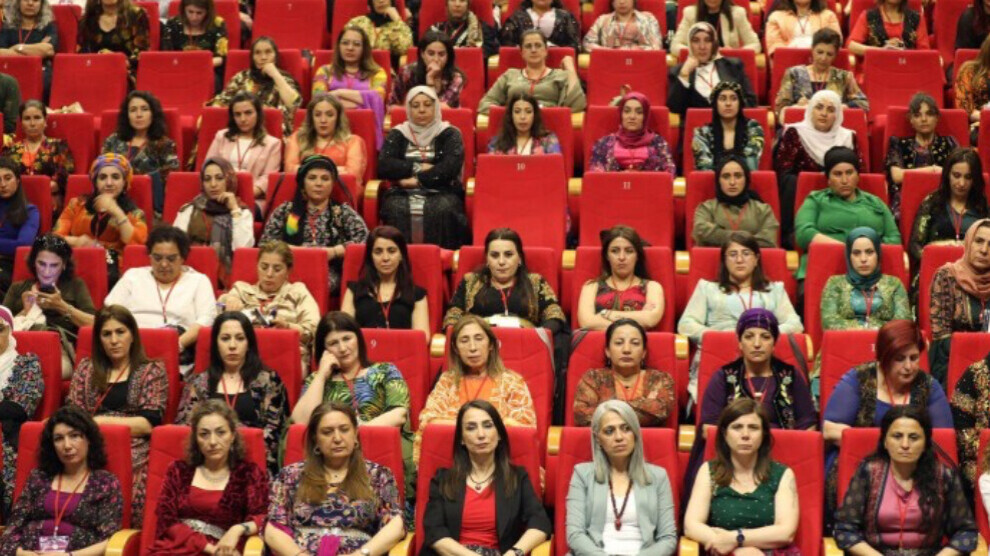Democratic women's confederalism to begin from the local level
The Democratic Regions Women’s Meeting of the DEM Party was held in Diyarbakır.
The Democratic Regions Women’s Meeting of the DEM Party was held in Diyarbakır.

The “Democratic Local Governments Women’s Meeting” was organized by the Peoples' Equality and Democracy Party (DEM Party) on 23–24 May at the Çand Amed Congress Center.
The meeting was held under the slogan “Jin jiyan e, jiyan xwebirevebirin e” (Woman is life, life is self-governance), and the final declaration was made public.
Women’s perspective in all fields of struggle
The declaration stated: “On the first day of the meeting, we emphasized the need to strengthen women’s perspective as the intellectual and social vanguard of democratic modernity in all areas of social struggle. This response arises from the destructive policies of capitalist modernity and the nation-state mentality, whose intertwined crises have triggered widespread war regimes, especially in our geography but also globally, bringing devastation to women, children, nature, and entire peoples.”
Call for peace and a democratic society
One of the central topics discussed during the meeting was the call made by Kurdish people's leader Abdullah Öcalan on 27 February for “Peace and a Democratic Society.” The importance of the opportunities this call presents for the peoples of Turkey to live freely and equally was evaluated. It was stressed that everyone must unite around this historic call with great sensitivity, especially in efforts to build social peace and a democratic society, and that solidarity must be expanded. The national and international reflections of this call were also assessed. While the processes for peace and democratic resolution carry historic potential, they also come with serious risks. Therefore, the meeting included key discussions on how local governments can organize and expand a climate of social democracy and peace from the grassroots level, to ensure this process develops and concludes in favor of the peoples of Turkey and the region.
Democratic, ecological, and women’s freedom-based local governments
On the second day of the meeting, participants focused on the vital role of women in peacebuilding and on the transformation of male-dominated, authoritarian, hierarchical, and centralized structures in local governance. The discussions also addressed the serious destruction experienced during the eight-year period of state-appointed trustees, particularly the dismantling of women’s gains and the impact on municipal governance. It was reaffirmed that overcoming this damage requires the implementation of our paradigm of democratic, ecological, and women’s freedom-based local governance. This, it was emphasized, can only be achieved through a stronger application of the co-mayorship model. Marking the end of the first year under this framework, a process of self-criticism was also undertaken. Participants openly discussed the shortcomings and the ways in which efforts have fallen short of the aspirations of the women’s freedom struggle and its historical legacy. It was acknowledged that although some momentum has been gained over the past year, even under the constraints of trustee-imposed destruction, the paradigm of women’s freedom-based local governance has not yet been institutionalized or socialized to the desired level.
Particular attention was paid to the failure to implement effective, solution-oriented policies against feminicide, ecocide, child abuse, increasing poverty among women, discriminatory policies targeting refugee women, ableist practices, and special warfare tactics. The reasons behind these shortcomings were discussed, and a strong strategy was outlined to confront these oppressive policies in the coming period. The core strategy remains the organization of broad social resistance to violence against women. In this context, the meeting reaffirmed its commitment to the campaign “We Are Not Done Speaking! We Will Stop Violence Together,” launched during the week of 25 November, as a way to mobilize society across all areas of life.
Democratic women’s confederalism
The declaration emphasized that the strategy ahead can only be realized by socializing the paradigm of “Free and Equal Coexistence” and the “Co-mayorship System.” It was noted that co-mayorship should not be reduced to a simple gender balance between two sexes, but should aim to transform the deeply embedded relationship between men and women, where many social problems originate. In this sense, the co-mayorship system was described as the concrete expression of the paradigm of free and equal coexistence, a mechanism that ensures gender equality in governance and enables democratic administration to be built from the ground up, in line with the slogan “Jin jiyan e, jiyan xwebirevebirin e.” This structure is to be made real through the establishment of commissions, coordination units, assemblies, and communes. In areas where these mechanisms have not yet developed and where collective will and common sense have not been activated, we, as co-mayors, expressed our self-criticism. We also reaffirmed our commitment to embed both the paradigm and the co-mayorship system more deeply into society. As a requirement of this model, we expressed our belief that Democratic Women’s Confederalism can be brought to life by joining forces with women from different beliefs, ideologies, and identities, and by building a governance model where everyone can express themselves in their own color and voice.
We stated that the institutional strengthening of the co-mayorship model, which guarantees women’s freedom and a democratic society, must be pursued with greater determination, that women’s participation in local democracy must be broadened, and that ensuring women’s active role in all decision-making processes is one of our fundamental responsibilities. In this direction, we emphasized that women’s political agency must be reflected in every aspect of local government. Based on these discussions, we reaffirmed our determination to resist all forms of state violence, including harassment, assault, torture, isolation, mechanisms of gendered oppression, policies that reinforce traditional notions of womanhood, and patriarchal institutions such as the family. We declared that we will build a free woman identity based on our women’s liberation ideology and principles, and that we will uphold a political stance that creates willpower, voice, and leadership in all areas of life. We underlined our belief that this can only be achieved through xwebûn: self-becoming and self-determination.